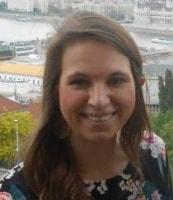The good, the bad, the possibilities: local food
This is the seventh article in our 8-part series of weekly blog posts called “The Good, the Bad, the Possibilities”. For this series, we are asking local experts three questions to give you a quick overview of recent local trends and solutions with respect to a range of important issues that affect our community’s sustainability. This week’s topic is local food, and our featured expert is Erin Hostetler, Board Member for the Charlotte-Mecklenburg Food Policy Council.

Erin Hostetler
Erin is the Program Coordinator the Energy & Environment Innovation Foundation and Rivendell Farms of the Carolinas where she is actively involved with food systems and environmental work. Erin holds a Master of Arts in Global Ethics & Human Values from Kings College London with a focus on food ethics and has spent the last four years working as a farmer to gain the food systems experience needed to make true change in her community. As a Charlotte native, she is committed to furthering awareness of the food community in her hometown and promoting active involvement within it. Erin also owns The Patio Farmer, a consultation business where she teaches people how to grow food in small spaces. In her free time, you’ll likely find Erin with her sleeves rolled up, sweat on her brow and hands in the dirt.

With regard to local food, over the past few years:
What are 2-3 positive trends or developments?
“There is a lot of momentum within the Charlotte food community to create change and innovation, from the City’s Farmer’s Market Study to the efforts to obtain a Voluntary Agricultural District; creation of a comprehensive food systems Map of the Charlotte region; robust urban farming projects popping up; large-scale farms focusing on the Charlotte market; the work being done on the west-side and by other non-profits for workforce development; to name a few. There’s a lot going on, which is always exciting to be a part of.”
“We (the local food and farming advocates) are catching the eye of community leaders, specifically, staff at the City level (Community Engagement & Planning), County Commissioners, City Council members, foundations, and other civic and community leaders are being tapped and asked to engage in the local food conversation.”
“Some of the traditional “silos” are beginning to break down. That’s to say, people and organizations who have been working towards common goals are starting to stop, collaborate and listen, to and with one another.”
What are 2-3 negative trends or developments?
“The Charlotte Food System and it’s network of influence continues to be “marginalized” within mainstream Charlotte culture. We have a very vibrant and robust food and farming system in the Queen City but often times we are a “sideline” feature and not part of the “feel” or overall culture of the City. Charlotte has a tendency to focus on the new, the “shiny penny” of the moment. Farming and the food system are gritty, grounded and practical ways of living that promote environmental sustainability and create a relationship with the food we eat.”
“Have you ever tried to search for your neighborhood farmers market or community garden? What about opportunities to volunteer with food related organizations? Tried to find a CSA to join? Have much luck? Charlotte lacks an online (and/or printed) platform to communicate with the general public about the resources, tools and connections “we” (local food and farming advocates) provide to the City and the region. The Charlotte region needs a funnel, or information hub, for all things related to local food whether that be local farms, community gardens, food access opportunities, nutrition education, local food establishments, retail opportunities, farmer’s markets, wholesale, distribution, etc.”
“Local farmers continue to lack a formal voice, specifically in Mecklenburg County. More could be done to support their livelihood, protect farmland and promote stronger career pathways into agriculture.”

What solutions would help reverse the negative trends/developments?
“What could be done to not only bring the local food and farming community to the forefront of thought for new and old Charlotteans is to create an online platform where people could easily access information related to local food, whether you’re interested in growing, buying, supporting, volunteering, etc. Charlotte needs a local food portal that has a regional reach and connects sectors to meet the needs of the general public. Rivendell Farms of the Carolinas in partnership with the Charlotte-Mecklenburg Food Policy Council, Piedmont Culinary Guild, Center for Environmental Farming Systems and the Carolina Farm Stewardship Association, in addition to other community partners, are working to create a Charlotte Food Systems Map that will not only be a funnel of local food information but will also act as a platform for additional tools and resources.”
“A Voluntary Agricultural District (or VAD) in Mecklenburg County would be a huge step towards continuing to support local agriculture. A VAD would establish a Voluntary Agriculture Review Board that would be consulted in various land management and development decisions. It would essentially work to promote farmland preservation and provide farmers a formal voice in development conversations. There are currently over 230 farmers still operating in Mecklenburg County and while many people don’t associate Charlotte with farming, agriculture remains the number one industry in the state. Mecklenburg County is also one of twelve counties in NC that does not have a VAD. As a leader across so many other industry sectors, Mecklenburg County has the potential to lead in agriculture too.”
Want to learn more about local foods? Read our post about our September Grow Smart CLT event, here. And check back for more interviews with sustainability experts!
Thanks for reading!
As a nonprofit, community support is essential for us to keep doing what we do — including providing free articles like this. If you found this article helpful, please consider supporting Sustain Charlotte.
Want to stay in the loop? Subscribe to our weekly newsletter and follow us on Instagram, Facebook, and Twitter.
